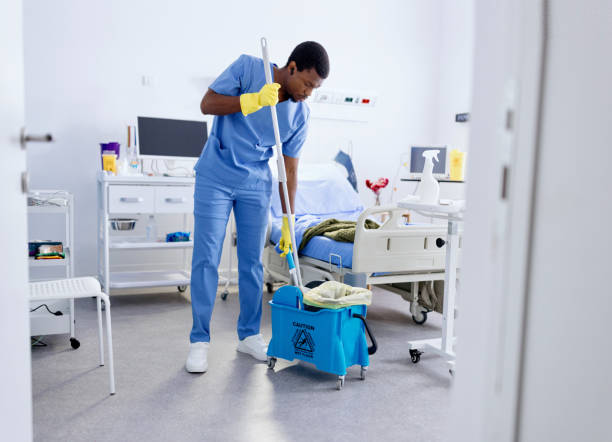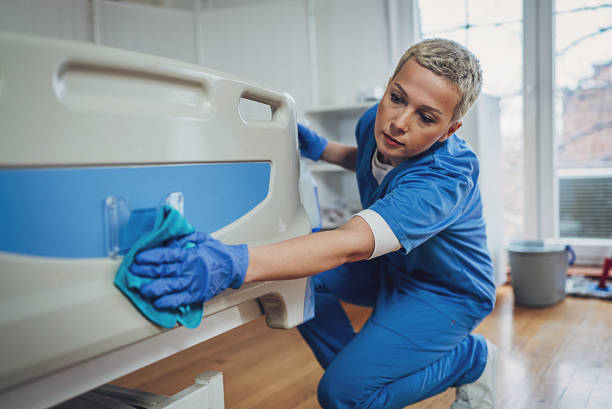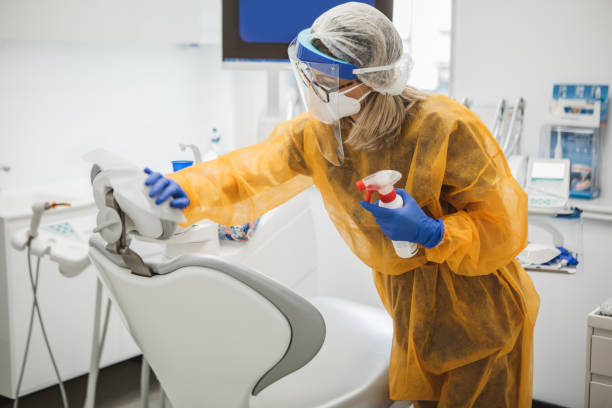In healthcare, cleanliness is not just a priority but an absolute necessity. Healthcare facilities, from small private clinics to sprawling public hospitals, are places where health is restored, lives are saved, and recovery is nurtured. These spaces must embody the highest standards of hygiene and sanitation to protect patients, visitors, and healthcare workers.
Medical cleaning, distinct from standard commercial cleaning, is a specialized service that ensures healthcare environments remain free from pathogens, promoting safety and well-being. This article delves deeper into the critical role of medical cleaning, examining its impact on patient care, operational efficiency, legal compliance, and public trust.

Controlling the Spread of Infections
Healthcare facilities are inherently high-risk environments for infection transmission. Patients with compromised immune systems, individuals carrying infectious diseases, and frequent contact with high-touch surfaces create the perfect storm for pathogens to thrive.
Common culprits include elevator buttons, door handles, countertops, stair rails, and airborne droplets carrying bacteria or viruses. Professional medical cleaning ensures these surfaces are routinely disinfected, minimizing the risk of infection.
For patients with weakened immune systems—such as cancer patients undergoing chemotherapy or individuals recovering from surgery—these cleaning protocols can mean the difference between recovery and severe complications. For instance, nosocomial infections (infections acquired in a hospital setting) are a significant concern in healthcare, often linked to inadequate cleaning practices.
Thorough medical cleaning disrupts the chain of infection, protecting patients and staff while fostering an environment conducive to healing.
Preventing Cross-Contamination
The intricate nature of healthcare operations necessitates using shared medical equipment, instruments, and even furniture. Items like surgical tools, ultrasound probes, and examination tables are used multiple times daily and can become breeding grounds for harmful microbes if not properly cleaned and disinfected.
To combat cross-contamination, healthcare facilities employ rigorous cleaning protocols that often include:
- Autoclaving: Sterilizing surgical tools and equipment at high temperatures to eliminate all microorganisms.
- Broad-Spectrum Disinfectants: Using specialized cleaning agents to sanitize surfaces and instruments.
- UV Light Technology: Leveraging ultraviolet light to sterilize operating rooms and other critical areas.
By integrating these advanced methods, healthcare providers ensure that shared equipment does not compromise patient safety.
Enhancing Employee Health and Productivity
Healthcare workers, often on the frontlines of patient care, are exposed to various hazards daily. In addition to infectious diseases, they face risks from biohazard materials, chemical exposure, and physically demanding tasks.
A clean and well-maintained workspace significantly reduces these risks, contributing to:
- Better Physical Health: Reduced exposure to pathogens means fewer sick days and lower healthcare costs for employees.
- Mental Well-Being: Knowing their safe work environment allows healthcare workers to focus on providing excellent care without undue stress.
- Increased Job Satisfaction: Cleanliness and orderliness create a professional environment, enhancing morale and productivity.
Investing in medical cleaning protects healthcare workers and ensures they can deliver the best possible care to patients.
Meeting Legal and Regulatory Standards
In many countries, stringent health and safety regulations govern the operations of healthcare facilities. For example, New Zealand’s Health and Safety at Work Act 2015 mandates that employers provide the highest protection from workplace health and safety risks.
Failure to comply with these regulations can lead to severe consequences, including:
- Legal Penalties: Fines or sanctions for failing to maintain a safe environment.
- Loss of Accreditation: Healthcare facilities risk losing their operating licenses if found non-compliant.
- Reputational Damage: Public trust is hard to regain once a facility is labelled unsafe.
Professional cleaning services help healthcare providers maintain compliance, shielding them from legal repercussions and safeguarding their reputation.
Promoting Patient Healing and Satisfaction
A clean healthcare environment does more than prevent disease; it actively promotes healing. Studies have shown that patients recover more quickly in clean, organized, and clutter-free spaces.
Consider the psychological impact: a spotless hospital room reassures patients and their families, instilling confidence in the care provided. Conversely, a poorly maintained facility raises doubts and anxiety, undermining the patient experience.
Cleanliness also extends beyond patient rooms. Waiting areas, cafeterias, restrooms, and administrative offices contribute to a patient’s overall impression of the facility. Every corner of a healthcare establishment must reflect its commitment to excellence and care.
Building Public Trust and Professionalism
The healthcare sector operates on a foundation of trust. Patients entrust their lives to doctors, nurses, and the facilities that house them. Maintaining immaculate cleanliness is a visible and tangible demonstration of this trust.
Every space in a medical facility must communicate professionalism, from the reception desk to the operating theatre. Patients who feel safe and cared for are likelier to return and recommend the facility to others.
Moreover, in the competitive healthcare industry, a facility’s cleanliness can be a deciding factor for patients choosing between providers. A sparkling clean clinic attracts new patients and retains existing ones, bolstering the institution’s reputation and success.
Adopting Cutting-Edge Cleaning Technologies
Modern medical cleaning goes beyond mops and detergents. Innovative technologies are transforming the industry, offering more efficient and effective solutions:
- Electrostatic Sprayers: Deliver disinfectants in fine mists, ensuring even surface coverage.
- Robotic Cleaners: Autonomous machines programmed to clean and disinfect large areas.
- HEPA Filtration Systems: Remove airborne particles, improving indoor air quality.
By embracing these advancements, healthcare facilities can achieve higher standards of cleanliness while optimizing operational efficiency.
Expanding the Scope of Medical Cleaning Services
Medical cleaning extends beyond direct patient care areas like operating and patient rooms. Other critical zones require equal attention, including:
- Laboratories: Research and diagnostic labs handle sensitive materials and specimens that must remain uncontaminated. Cleaning protocols include sterilizing work surfaces, equipment, and storage areas to maintain accuracy and safety.
- Pharmaceutical Production Areas: Maintaining sterile environments in pharmaceutical labs is essential to ensure the safety and efficacy of medications. Any contamination can compromise product integrity, leading to severe health risks for consumers.
- Administrative Offices: Clean offices contribute to employee well-being and productivity, emphasizing the interconnectedness of hygiene and efficiency across the facility.
Each of these areas has unique requirements, making the role of specialized medical cleaning services even more indispensable.
The Role of Training in Medical Cleaning
Effective medical cleaning is not a one-size-fits-all solution. It requires:
- Extensive Training: Cleaners must understand infection control practices, proper handling of hazardous materials, and the correct use of cleaning agents.
- Certification Programs: Many countries offer certifications for medical cleaners, ensuring they meet stringent industry standards.
- Ongoing Education: As technologies and protocols evolve, continuous training ensures cleaners remain effective and up-to-date.
This specialized training underscores the importance of hiring professionals equipped to handle the unique challenges of medical cleaning.
Sustainability in Medical Cleaning
With the growing focus on environmental sustainability, healthcare facilities are adopting greener cleaning practices. This includes:
- Eco-Friendly Cleaning Agents: Using biodegradable and non-toxic disinfectants reduces environmental impact.
- Waste Reduction Programs: Implementing strategies to minimize disposable cleaning materials while maintaining effectiveness.
- Energy-Efficient Equipment: Leveraging machines that consume less water and energy during cleaning.
Sustainable cleaning protects the environment and reflects positively on the healthcare facility’s social responsibility efforts.

Conclusion: Prioritizing Hygiene for a Healthier Tomorrow
Medical cleaning is far more than a routine task—it is critical to patient safety, employee well-being, and public health. Its impact reverberates across every aspect of healthcare, from infection control to legal compliance and patient satisfaction.
In a world increasingly aware of the importance of hygiene, investing in professional medical cleaning services is not a luxury but a necessity. For healthcare facilities striving to deliver the highest quality of care, cleanliness is the cornerstone of their mission.
A clean hospital or clinic ultimately reflects its commitment to health, healing, and humanity. By prioritizing sanitation, healthcare providers can foster environments where patients thrive, employees excel, and communities trust. In this way, medical cleaning protects lives and upholds the integrity of the healthcare profession.

